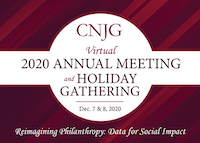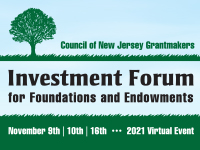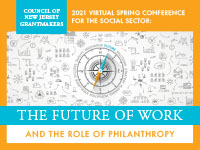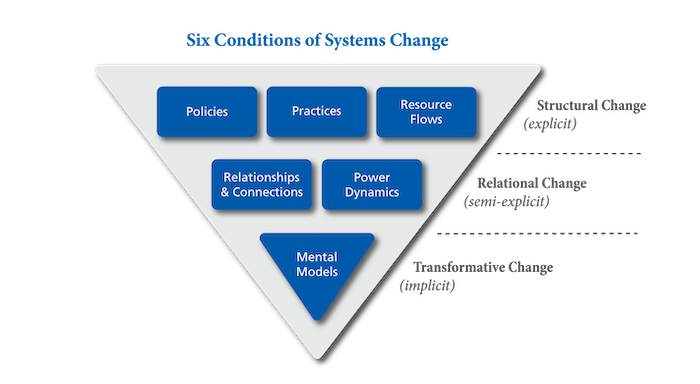Site Search
- resource provided by the Forum Network Knowledgebase.
Search Tip: Search with " " to find exact matches.
Native Voices Rising is a joint research and re-granting project of Native Americans in Philanthropy and Common Counsel Foundation. This report focuses on the practices and challenges of community organizing and advocacy, focusing on the need for increased investment in and sustained support for American Indian, Alaska Native and Native Hawaiian communities.
A corporate member asked for what other corporations do regarding employee’s goal and objectives. Do they include volunteerism or volunteer activities as part of an employee’s review, or their annual goals?
CNJG's 2018 Annual Meeting & Holiday Luncheon pre-meeting workshop with Michelle Greanias from PEAK Grantmaking focused on how foundation CEO’s, program officers, staff, and trustees could engage internally to put values-based grantmaking into practice.
Walk the Talk Video
Adopted by CNJG”s Board of Trustees in October 2023, these eight Principles offer philanthropy a source of direction for their own equity journey. Each principle begins with a common understanding followed by developmental steps, and the aspiration for each principle. These principles are intended to promote continuous learning, vulnerability, and reflection for how philanthropy can evolve from its historical roots to a more trusting, accountable, and equitable model.
An overview on the self-dealing law, including definitions, common problem areas, exceptions, penalties, and resources.

There is a plurality of definitions of the term systems change, each contextualized within different cultures and purposes. Doing Good Better embraces systems change as an inter-sector process that addresses complex social problems nonprofits and funders confront with collective action centered on equity, mutual respect, and resilience. Systems change refers to changing the parts and their relationships within a system with the understanding that this change will have ripple effects. As grantmakers, we need to create an environment that enables grantee effectiveness, so they can deliver on their mission. Systems change in philanthropy focuses on structures, policies and processes, resources, values, power, mindsets and, infrastructure that is illustrated in three iterative phases. In time, we hope that the application of this model will result in collective impact and a more resilient social sector for all of New Jersey.
The first phase is structural (operational) change, which involves funders adopting new policies, practices, and resource flows. The second phase is characterized by new relationships and connections that emerge from structural change eschewing old power dynamic practices. Finally, the third phase is transformative change, which occurs when change becomes rooted in organizational culture and mores. We cannot underestimate the length of time and learning at each stage. Achieving transformative change can be a long journey, but it is a learning journey. One grantmaker stated, “One change led to another and another, like dominos. I started to see what people meant by systemic change. New energy and excitement surged among us as hope grew and the cloudy vision of what we wanted became clearer and clearer.”
Although the figure below displays the six developmental stages as linear and distinct, change is unlikely to follow a linear path. Any change in a system will seldom stay fixed at one of these stages but rather will shift back and forth from one stage to another on the path toward the ideal state. We believe just one organization can’t shift the conditions that hold problems in place; we all must share the same perspectives and move the sector together and simultaneously. We call for all of those involved in the sector to work together to build a better and more equitable nonprofit and philanthropy system for all New Jerseyans.
Graphic comes from “The Water of Systems Change” by John Kania, Mark Kramer, and Peter Senge.
Doing Good Better, a partnership of the Council of New Jersey Grantmakers and the New Jersey Center for Nonprofits, is a community of funders and nonprofits taking action against the power imbalances and racial inequities in philanthropy, nonprofits, and government.

Please Log In to view resources from this event.
Reimagining Philanthropy: Data for Social Impact
Held:
Monday, December 7 - 2:00 to 3:30 pm -- Skill-Building Workshop
Tuesday, December 8 - 12:30 to 2:00 pm -- Business Meeting & Keynote Presentation
Thank you to everyone who attended CNJG’s first ever virtual Annual Meeting & Holiday Gathering. This year’s meeting focused on the many ways philanthropy can use data for social impact.
Data science is a powerful tool to address housing and food insecurity, education inequality, health disparities, civic injustice, and other longstanding social issues that continue to intensify during the pandemic. Building data capacity equips local leaders with information to develop and advocate for more effective policies. New evaluation strategies can outperform outdated processes that reinforce inequities and slow progress. Research and technology that fuels innovation in the private sector can help nonprofit and government organizations drive impact in New Jersey communities..
On Day 1, the Annual Meeting Workshop focused on evaluation and learning practices that center equity and social impact. And on Day 2, Keynote panelists shared how data science can help connect people to services, address racial inequity, and create greater impact in our communities during the pandemic and beyond..
Philanthropy can’t go back to “normal,” because normal wasn’t good enough. During this year’s Virtual 2020 Annual Meeting & Holiday Gathering we explored how we can reimagine philanthropy by harnessing the full power of data for social impact.
The Council of New Jersey Grantmakers would like to thank our sponsors for their generous support: Signature Sponsors – Novartis and PSEG; Sustaining Sponsors – Prudential and Horizon Blue Cross Blue Shield of New Jersey; Collaborating Sponsor – Robert Wood Johnson Foundation; and Performance Sponsor – The Provident Bank Foundation.

Dates & Times
Tuesday, November 9 - 1:00 to 5:00 p.m.
Wednesday, November 10 - 1:00 to 5:00 p.m.
Tuesday, November 16 - 1:00 to 5:00 p.m.
CEOs, executive directors, CFOs, trustees, investment committee members, and finance managers of foundations and endowed nonprofits gathered together over three afternoons of learning and discussion during CNJG’s 2021 Investment Forum for Foundations and Endowments.
Attendees heard from leading asset managers, financial service institutions, professional advisors and practitioners who shared best practices and valuable insights focused on successful endowment management. Pointed, strategic, and masterful keynote speeches and educational workshop sessions explored a wide range of timely and useful topics, such as impact and ESG investing, gift acceptance policies, alternative investments, governance and due diligence, and so much more.
Sustainable philanthropy thrives on careful and skillful stewardship of the corpus. This signature event grew out of the Council of New Jersey Grantmakers’ Finance and Investment Affinity Group convenings, which have long offered CFO’s, investment committee members, board chairs and others with oversight of their endowment, exposure to a wide range of representatives, as well as thoughtful expertise and perspectives from the investment community.
Access Whova until May 16, 2022!
Registrants can access all three plenary sessions and 11 concurrent sessions on Whova for six months after the event, until May 16, 2022. You can log in with the same email and password you used to access the event. Visit Whova.
For questions, please contact Anna D'Elia, Manager of Programs and Learning.
The Future of Work and the Role of Philanthropy

Dates: Wednesday, May 19 and Thursday, May 20
Time: 2:00 to 5:00 p.m.
One of the most valuable learning and networking events for the social sector in the state, CNJG’s 2021 Virtual Spring Conference considered the role of philanthropy in shaping how, where, and why we work.
The coronavirus pandemic has impacted and propelled the future of work in ways we couldn’t have imagined. But even before the pandemic - the automation of jobs, the gig economy, the ongoing need for reskilling and retraining, changing demographics, green careers, lack of job security and more – has been setting the stage for novel ways of working. The Spring Conference explored this new, accelerated work paradigm, it’s profound impact on New Jersey’s industries, workers and communities, and the implications for grantmakers and their nonprofit partners.
This timely and important event brought together national and local thought leaders, experts and stakeholders to share what the social sector can do to ensure a better future for New Jersey’s workforce. Attendees engaged in candid, visionary conversations around equitable labor standards and professional practices, the changing, post-pandemic workplace, strategies to fill gaps in skills, education, and opportunity, the effects of new federal job policies on workers, and much more.
Thank you for joining the Council of New Jersey Grantmakers for an exploration about what lies ahead as we prepare for and address pressing and unprecedented changes in the world of work.
Only people who registered for the Conference will be able to access WHOVA. For assistance or additional information, please contact Anna D’Elia, Manager of Programs and Learning.
CNJG encourages its membership to participate in the Council on Foundations’ annual salary survey to help shape the future of philanthropic compensation.
The Council on Foundations’ 2025 Grantmaker Salary and Benefits (GSB) Survey is now open. The deadline to complete the GSB is Wednesday, May 28, 2025.
Since 1980, the GSB has provided the philanthropic sector with the most comprehensive data on staff composition and compensation in the United States. Grantmakers rely on the findings from this annual survey to plan budgets, benchmark personnel policies and practices, determine salary levels for new and existing staff, and more. Those who complete the survey will receive a free copy of the report (a $598 value), early access to the report’s data tables, and access to create custom benchmark reports.
CoF’s full survey will be published in fall 2025. More information and the survey may be found on the Council on Foundations' website.
Any and every philanthropic organization is invited to participate. Membership is not required with either the Council on Foundations or Council of New Jersey Grantmakers to participate in the survey. For more information, including a list of FAQs, visit the Council on Foundations' website or email the Council on Foundations communications team.
CNJG incorporates the data from this annual survey into our triennial Philanthropy Benefits & Salary Summary Report, most recently published in 2023. CNJG plans to update our report in 2026 again using the data from the Council on Foundations’ survey.
CNJG encourages our members and all philanthropic organizations in New Jersey to complete the CoF survey each year, as this benchmarking data is frequently asked for by our members. The more foundations and other philanthropic organizations that complete the survey, the better and more statistically relevant data we will all have.
For additional information or questions, please contact Craig Weinrich at CNJG.

